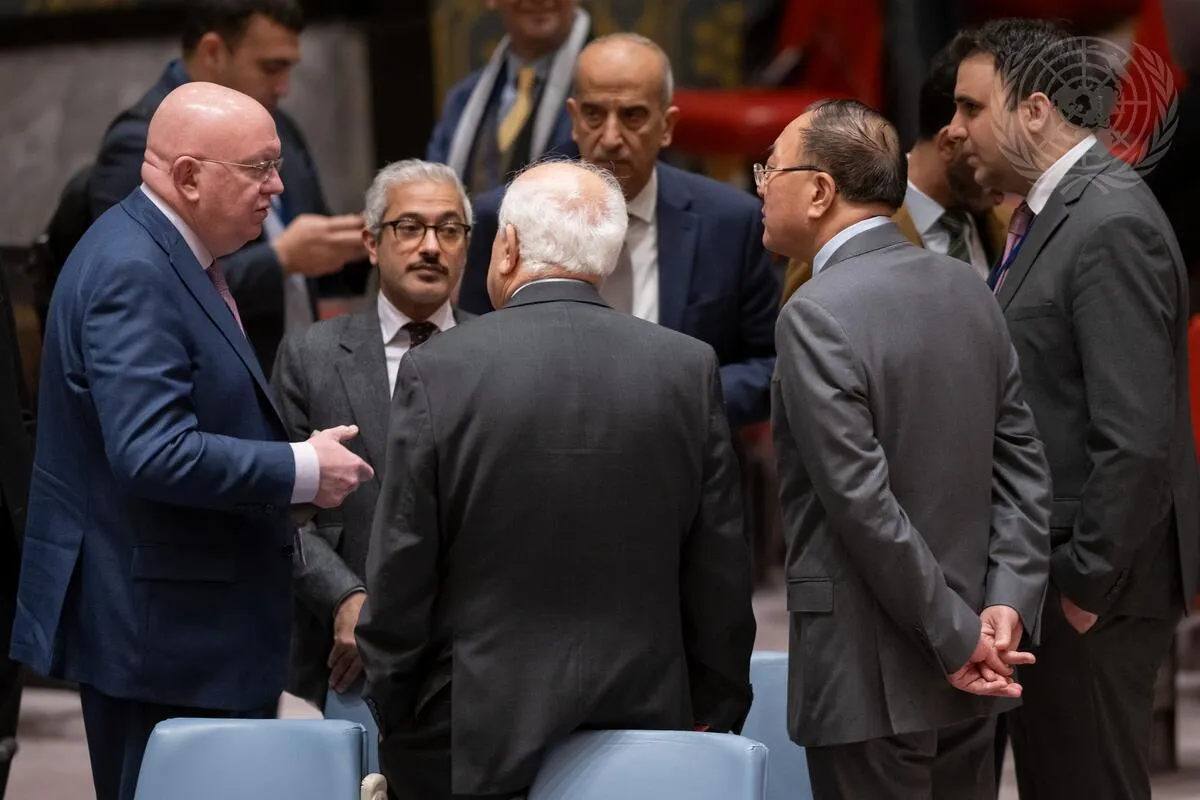Only today did a resolution finally pass the United Nations Security Council, addressed to relieving the catastrophe in Gaza. The resolution does not call for a ceasefire, but only “to create conditions for sustainable cessation of hostilities”—wording pre-approved by the U.S. after days of haggling. Other measures in the 16 points of action address expediting humanitarian aid. The resolution passed 13 in favor, with two abstentions—the U.S. and Russia (for very different reasons).
Formally, this key institution, the Security Council, of the United Nations is still intact, but the content of today’s resolution is completely lacking for what must be done to stop the carnage in Gaza and intervene to prevent spillover to World War III.
The mobilization is critical by the Schiller Institute and collaborators for a ceasefire, an “Oasis Plan” approach to Gaza and the greater region.
United Nations Secretary General António Guterres on Dec. 6, wrote to the UN Security Council, invoking the seldom-used UN Article 99, that the Council must take emergency action to stop the worsening “catastrophe” in Gaza. He had been calling since Oct. 18 for an “immediate humanitarian ceasefire,” with no result, except more death, and likelihood of spillover into regional war. It was then that he took the recourse of invoking Article 99, saying that without intervention, the dire situation “may aggravate existing threats to the maintenance of international peace and security,” which is the condition under which the Secretary General can direct the Security Council to act.
The United Arab Emirates has taken the point, and has been working on the text of a Security Council resolution all along, but the United States, with the U.K. alongside, sometimes in the shadows, repeatedly and conspicuously opposed any effective action by the Security Council. The U.A.E. has been acting in particular on behalf of the League of Arab States, the Organization of Islamic Cooperation, and billions of people the world over who want a stop to the mass killing. The ceasefire resolution in the UN General Assembly passed with 153 nations voting in favor. In the latest fight, the U.A.E. began Dec. 15 with a new draft text for the Security Council. But the U.S., day by day, insisted on changes, especially the dropping of not only the term “ceasefire” but even dropping the phrase “suspension of hostilities” in favor of merely “creating conditions for sustainable cessation….”
Today, Russian Permanent Representative to the UN Vassily Nebenzia explained why Russia abstained, and did not veto and thereby block a resolution it disapproved of: It was out of respect for fraternal Arab countries and others that want to get a resolution passed, just to get more urgent humanitarian aid going. He called today’s resolution “toothless” and “emasculated.” Nebenzia also made clear that “no matter how much the United States resists in defending its main Middle Eastern ally, the Council will return to this issue and will clearly and unequivocally demand a cessation of hostilities.” It is notable that the Arab-Russian Cooperation Forum in Marrakech, Morocco, issued a joint call on Dec. 20, which included the “Call for the convening of an international peace conference, as soon as possible….” for Arab-Israeli peace.
The U.S. also abstained in today’s Security Council resolution vote, under the nominal excuse that the text does not denounce Hamas.
This episode is indicative of the overall dangerous strategic situation. Secretary General Guterres briefed the press after the Security Council’s passage of Resolution 2720, giving a run-down of the horrible situation in Gaza, beginning by saying that it is too terrible for words. “Shelves are empty; wallets are empty; stomachs are empty. Just one bakery is operating in the whole of Gaza.”
The message for us all, is to escalate in every possible way to stop the warfare rampage in Southwest Asia, Ukraine, and at other locations and stages. In these circumstances, collaborate and spread the activities of the International Peace Coalition, which met for the 29th week today. There were reports on many initiatives. Helga Zepp-LaRouche, leader of the Schiller Institute issued her Christmas message on Dec. 21, “Turn Swords Into Plowshares.”
On the urgency of mobilizing to stop the carnage in Gaza, it was announced at today’s IPC meeting that the Schiller Institute is issuing a new fact sheet of charts documenting the military-industrial-financial complex, titled, “Turn the Military-Financial Complex
to Useful Production,” prepared by an EIR News research team, and will also be posted on the Schiller Institute website.







